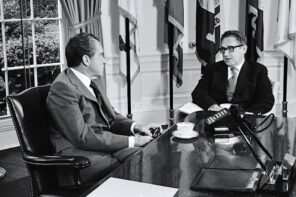Punk rockers in Myanmar are gaining international attention for publicly denouncing Buddhist monks’ genocidal treatment of Muslim minorities.
In the last two years, sectarian violence in Myanmar’s Arakan State has resulted in the displacement of over 140,000 members of the Rohingya minority, as well as the deaths of thousands more. The recent surge in violence appears to have been incited by Buddhist monks.
The Rohingya, who number almost one million, have been denied citizenship since 1982 and subjected to denials of the rights to travel, marry and have children. The discrimination appears rooted in the ethnic group’s Muslim faith, which makes them a tiny minority in the majority-Buddhist nation.
The most notable participants in the violence are a movement of Buddhist monks called “969”. The movement, which is led by a monk named Wirathu, has used a nationalist stance to campaign against the Rohingya, in part by falsely alleging that they are “Bengali” illegal immigrants from neighboring Bangladesh. While the number “969” is derived from Buddhist concepts, the movement appears to rely on economic anxieties, rather than religious philosophy, to incite anti-Muslim sentiment.
While some monks have called the 969 movement a fringe group, anti-Rohingya protests have drawn hundreds of monks in capital city Yangon in the past year. Burmese dissident Maung Zarni has called the movement “the most popular movement in the country” and has said, “There is a parallel between what we saw in Nazi Germany and what we are seeing today in Burma.”
Punks in Yangon are speaking out against the monk-led genocide to international media. The outsider subculture contrasts with the Buddhist Burmese majority, whose strong reverence for monks discourages openly opposing them.
Punks’ response also contrasts sharply with that of dissident-turned-party-leader Aung San Suu Kyi, who was released in 2011 from a lengthy house arrest imposed by the junta. Suu Kyi has spoken up against restrictions on Muslim reproduction, but has avoided addressing ongoing violence against Muslims. She calls reticence necessary for reconciliation, but her critics say it is due to her presidential ambitions, which rely on the Buddhist majority’s votes and changes in eligibility law from the standing military government.
Like Suu Kyi, monks acting in opposition to the Rohingya are closely tied to the government. Minister of Religious Affairs Sann Sint has openly praised the monks. Meanwhile, President Thein Sein has reacted to the humanitarian crisis by asking the UN to remove the Rohingya from Myanmar. (The UN declined.)
Punks, in contrast, exist as an underground movement with minimal government ties. Prior to the 2010 government change, they operated largely in secret.
It is unclear whether the tiny punk movement in urban Myanmar has substantial connections to Rohingya people or other Muslims or to any organizations benefiting them. Today, the scene may be in decline.
But punks may not be the only ones ready to oppose the violence against ethnic minorities. Although public opinion against Muslims is strong in Arakan state, the public response to recent anti-Muslim violence in Meiktila has included convoys of practical support from Muslims and Buddhists alike.




